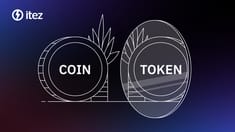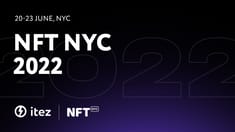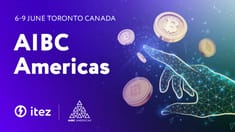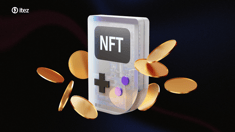In recent years, the technologies behind cryptocurrency and blockchain continue to evolve, finding new applications in people’s lives. One such technology is the decentralised blockchain known as Internet Computer (ICP).
From our new comprehensive guide, you'll learn what is Internet Computer and how this blockchain is already changing the internet as we know it.
Introduction to Internet Computer (ICP)
What is Internet Computer?
Internet Computer is a blockchain-based platform that provides decentralised cloud computing services. It has a native token called ICP, which is used to manage and support the network.
This blockchain platform was developed by Dfinity Foundation with one main goal—to make the internet fully decentralised and independent of large IT corporations, such as Google, Facebook, Amazon, or others. There is no centralised governing body in the network, meaning users and developers can autonomously deploy and manage applications on a decentralised network that operates on blockchain technology. This is what fundamentally sets ICP apart from the traditional internet.
Source: X
ICP Meaning and purpose
Now, let’s dive into what is ICP. As mentioned earlier, ICP is the native cryptocurrency of the project. It serves both as a mechanism to incentivize network participants and a means to pay for the computing resources required for applications on the platform.
At the time of writing, ICP ranks 26th in the list of the most capitalised digital assets. Source: CoinMarketCap
Essentially, the core ICP meaning lies in these functions. Additionally, the token is traded on the market alongside other digital assets, such as Bitcoin (BTC) or Ethereum (ETH). As of writing, altcoin holds the 26th spot in the ranking of the most capitalised assets.
How Internet Computer works
The technology behind ICP
Internet Computer operates using a network of specialised devices called "node machines." These machines are connected through the Internet Computer Protocol (ICP) and are installed in independent data centres by independent "node providers."
If you're wondering, "But what unites these independent nodes into a global network?", the answer is simple—it's the consensus protocol. This protocol connects all the node providers, ensuring that all operations are secure and verifiable. This eliminates the need for centralised servers, increasing the resilience and security of applications.
Another particularly interesting aspect is the use of "canister" smart contracts. These act as containers for code and data, allowing applications to interact with each other within a decentralised network.
Role of blockchain in Internet Computer
Naturally, the foundation of all these technological innovations is blockchain technology. For Internet Computer, it plays a central role in ensuring the authenticity and immutability of data.
Unlike traditional blockchains like Bitcoin or Ethereum, Internet Computer uses distributed computing power to execute code and store data. In this way, the blockchain doesn’t just record transactions; it actually runs programs and manages applications.
How ICP differs from traditional internet
The key difference between Internet Computer and traditional internet lies in decentralisation. While the current internet relies on centralised servers run by large companies (e.g., Google, Amazon), ICP allows any participant in the network to deploy applications without intermediaries. This makes the network more resistant to censorship, cyber-attacks, and provides greater privacy for data.
Core components of Internet Computer
Internet identity. One of the key components of ICP is Internet Identity—an authentication system that uses cryptography to manage user accounts securely. It replaces traditional passwords with more secure access methods, reducing the risk of hacks and data leaks.
Canisters and smart contracts. Canisters are the primary building blocks of applications running on Internet Computer. They enable developers to create and deploy decentralised applications (dApps), which are managed by smart contracts. Unlike traditional servers, canisters ensure automatic execution of rules and conditions set by developers.
Decentralised applications (dApps) on ICP. The ICP platform supports a variety of dApps that operate without the need for centralised servers. These applications can be used across multiple industries—from fintech to social networks and content management systems.
Benefits and use cases of Internet Computer
Advantages of using ICP
One of the main advantages of using ICP is its decentralisation and low cost of running applications. Here are some of the project’s other benefits:
- The project has garnered support from many prominent market participants, including Andreessen Horowitz.
- Developers already have ready-to-use technical solutions that can be practically implemented.
- The project’s cryptocurrency is listed on several popular exchanges, which rigorously check the security of coins before listing.
Key use cases in various industries
ICP finds applications across various sectors. For instance, in finance, it can be used to deploy decentralised exchanges or payment systems. In education, the platform can create secure systems for managing educational content.
Examples of dApps on ICP
As of writing, there are 303 projects running on the Internet Computer network. Here’s the distribution by industry:
- Tools / Infrastructure — 160
- Internet Identity — 143
- SocialFi — 60
Projects running on the ICP network at the time of publishing. Source: Internet Computer
The ICP token
What is the ICP token?
As discussed earlier, ICP is the native token of the Internet Computer project. It is used for network governance, transaction payments, and other operations within the ecosystem.
Price dynamics of ICP over the past year. Source: CoinMarketCap
Besides that, the asset is traded on the market alongside other cryptocurrencies. As of 8th October, ICP is trading at $8.01. The chart below shows that the altcoin has been in a downward trend since peaking above $19 in late March this year.
Tokenomics and distribution
The DFINITY team conducted a token sale in 2017. In the summer of 2018, the developers organised a token distribution. The coins were unlocked on 7th May 2021.
ICP token tokenomics. Source: Medium
The total supply of ICP tokens is capped to 523,712,485, and they are distributed among network participants based on their contribution to network security and operations. Developers creating dApps on the platform are also rewarded in ICP for their projects.
How to buy and store ICP
At the time of writing, ICP can be purchased on many popular cryptocurrency exchanges, including Binance, Huobi, KuCoin, and OKX. The coin is traded in pairs with traditional cryptocurrencies, stablecoins, and fiat currencies.
Buying ICP token on Binance. Source: Binance
To store ICP, as with any other cryptocurrency, it's recommended to use secure storage options. These can be hot wallets, ideal for quick and frequent trading, or cold wallets, which are often used for long-term storage of large sums.
Internet Computer and Web 3.0
How ICP contributes to Web 3.0
Our most attentive crypto frens might have already noticed that the concept of Internet Computer closely resembles the idea of Web 3.0.
As a reminder, Web 3.0 is the concept of a decentralised internet, where users regain full control over their data rather than corporations. This type of internet is neither governed, controlled, nor censored, offering people the potential for true digital freedom. You can find more about this next-gen internet in our dedicated review.
Thus, ICP blockchain network can be considered the leading contender for laying the foundation for building this new internet. As we've already covered, this platform provides the infrastructure for creating decentralised applications and services. Moreover, Internet Computer support smart contracts, meaning tasks can be automated without the need for centralised control.
Future prospects and developments
The Dfinity Foundation continues to actively develop the project, adding new features and expanding the dApps ecosystem. On the other hand, Internet Computer has already gained the backing of notable market players such as investment giant Andreessen Horowitz, Aspect Ventures, and Polychain Capital. Additionally, the project’s cryptocurrency is supported by numerous popular centralised exchanges (CEX), which are known for conducting thorough security checks before listing coins.
All the factors mentioned above suggest that the future prospects for Internet Computer appear promising. However, it’s important to remember that even with all these positive indicators, there's no 100% guarantee against risks, meaning any investment in the project or its cryptocurrency still carries certain risks.
Frequently Asked Questions (FAQ)
What is Internet Computer? Internet Computer (ICP) is a blockchain-based platform that provides decentralised cloud computing services, allowing users to autonomously deploy and manage applications without relying on centralised servers.
How does ICP work? ICP operates through a network of nodes connected via the Internet Computer Protocol (ICP), using canister smart contracts to run decentralised applications (dApps) securely and efficiently.
What are the benefits of using ICP? The main benefits of ICP include decentralisation, enhanced privacy, reduced maintenance costs, and resistance to censorship, making it a secure and scalable platform for dApps.
How can I invest in ICP? You can invest in ICP by purchasing the token on major cryptocurrency exchanges like Binance, Huobi, or KuCoin, and store it in secure wallets, either hot or cold.
Conclusion
Internet Computer (ICP) is a decentralised blockchain platform that allows users to deploy applications without centralised servers, offering scalability, privacy, and cost efficiency. It uses smart contracts and ICP tokens to power its infrastructure and supports the shift towards Web 3.0.
With strong development and industry backing, ICP could play a major role in the future of the decentralised internet. However, like any emerging technology, it carries risks that should be carefully evaluated.
🤔 Do you believe Internet Computer can change the Web we know today? Share your views in our socials!
💌 Telegram, Twitter, Instagram, Facebook
Here are three other cool articles:
What is cryptography? A comprehensive guide
Exploring the quantum financial system: revolutionising finance with quantum computing
Understanding protocols: the backbone of digital communication
This article is not investment advice or a recommendation to purchase any specific product or service. The financial transactions mentioned in the article are not a guide to action. It’s not intended to constitute a comprehensive statement of all possible risks. You should independently conduct an analysis on the basis of which it will be possible to draw conclusions and make decisions about making any operations with cryptocurrency.








